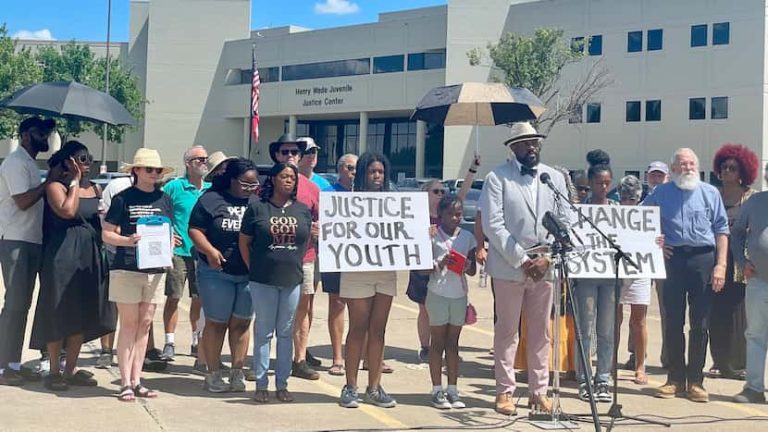Advocacy groups are calling on Dallas County officials to address problems at the Henry Wade Juvenile Justice Center, but one of the center’s leaders says those concerns are unjustified.
At a press conference Sunday in the parking lot of the juvenile detention center at 2600 Lone Star Drive, Dallas Black Clergy for Safety, Equity and Justice and several other groups spoke about the detention center and requested to meet separately next month with board members who oversee the facility. Among their concerns were the cleanliness of the facility, poor hygiene for detainees, a lack of educational programs and not enough time outdoors.
Two former detainees described their experiences, including being locked in their cells for 23 hours a day, only being allowed to shower for three minutes, and going untreated for their mental illnesses.
“You’re going to be dead here for life, even if you don’t die,” said Sha Smith, who was held at Henry Wade from age 13 to 17. “It’s still going to be traumatic.”
Michael W. Waters, founder of Abundant Life AME Church, said he has long been concerned about the situation at Henry Wade Church.
Last June, Dallas Morning News The report raised concerns about 10 families who had children at the center. At the time, the families said their children were locked in solitary confinement all day, not given adequate food or medical care. A former detention center official and a former staff member confirmed the parents’ stories. A similar report published by WFAA-TV earlier this month prompted the press conference, Waters said.
Dallas County Juvenile Services Commissioner Darryl Beatty, in a statement Sunday night, denied that the conditions at the center matched those described by the advocacy groups. He said what he has observed at the facility today and in recent months does not “in any way” match what has been publicly reported.
Other speakers on Sunday expressed frustration at false accusations and hypocrisy, saying their experiences at the facilities don’t teach teens to respect the law because the legal system doesn’t respect them.
“Are you serious, Dallas County?” said Frederick Douglas Haynes III, senior pastor at Friendship West Baptist Church. “You’ve decided to do this to kids that you’ve clearly labeled as problematic, rather than the environment they were raised in… rather than the environment you put them in?”
Beatty said much of the information being shared about the condition has been taken out of context. He pointed to a July 2023 report. A report from the Texas Department of Juvenile Justice found multiple problems at Henry Wade Correctional Facility, but the statement said all of those issues have been remedied.
Beatty also said he plans to hold a press conference in the coming days to further discuss the steps he has taken to resolve the issue.
Judge Cheryl Lee Shannon, the committee’s chair, issued a statement on behalf of “the majority of committee members” saying the committee is awaiting a final report from the Texas Department of Juvenile Justice’s Office of Inspector General, which was launched after a July 2023 audit found issues. That report identified problems primarily with the use of “disciplinary segregation,” which she also said those issues have been corrected.
Shannon did not directly address whether he or other board members were willing to meet with the Dallas Black Clarisse, but said in a statement that the majority of the board agreed to allow the inspector general’s process to proceed “without interference.”
Andy Sommerman, a Dallas County commissioner and member of the juvenile committee, said his office is already arranging a meeting with the Dallas Black Clergy Association, which is scheduled to meet just after Independence Day, July 4. He said he has asked for records to back up the concerns raised, but the request has been blocked by the Dallas County Juvenile Department.
“I have not seen anything to suggest that the issues that we have been complaining about for over a year have been improved or changed,” Sommerman said. “There may have been improvements, but I have not seen them.”
Dallas County Judge Clay Lewis Jenkins, also a committee member, shared similar concerns and said he would be willing to meet with anyone who wanted to improve conditions in juvenile detention centers.
“We want to do what’s necessary to not just give these kids the bare minimum, but to give them the best opportunity for rehabilitation and restorative justice so they can get out of there and live productive lives,” he said.

